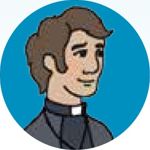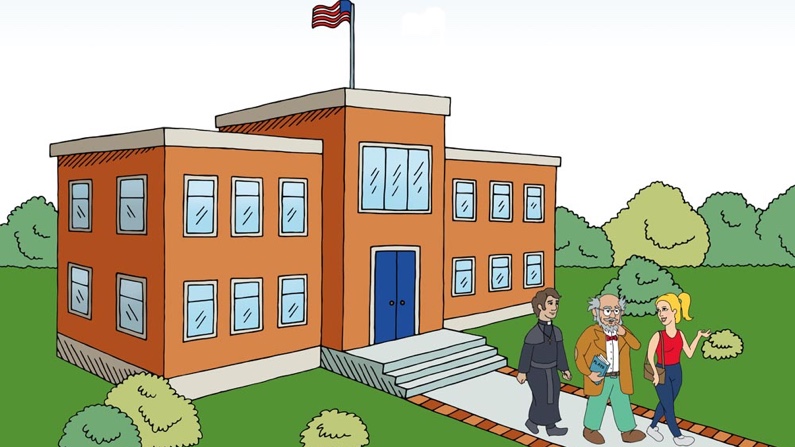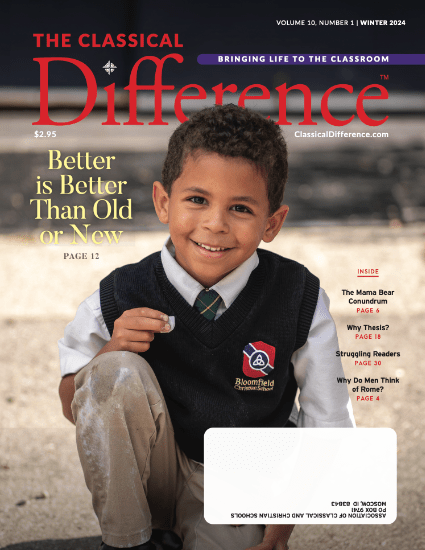Winter 2017
… and they all find something on which to agree.

Classical Christian education has come a long way. It traveled thousands of years to reach us where we are today, and it’s spreading. Here are three takes on classical education from perspectives you might not normally hear.

PARENT: Jackie Jamison
Our Experience With Progressive Education
The culmination of my son’s first grade year involved waving a large pink cardboard fish onstage while he sang about ten little fishies at our local public school. I was at the back of the auditorium bouncing our three-month-old, looking out at the backs of the 250 other parents and wondering how many were appalled at the inane display. This was the only time we had been called together as a group all year, so surely their performance encapsulated what the school thought was worthwhile. And by the standards of progressive liberal education, the performance was excellent. It was innovative—an original work written by the music teacher—with multiple learning styles, and a focus on loving the earth.
But what was true, good, or beautiful in that performance beyond the youthful enthusiasm?
The performance was a huge blessing to our family because it absolutely confirmed our decision to send our kids to The Regents School of Charlottesville [an ACCS school in Virginia]. Since then, I’ve gotten lots of questions about our switch, many of them from parents at my son’s new school, wondering how big a difference there really is in classical Christian education.
Our public school has a reputation for excellence. The classrooms are new, the technology is abundant, and the teachers are at the cutting edge. Of course, I knew I would not share the school’s worldview and expected that this would spark discussion. I was only partly right about this. The guidance counselor came in weekly and I always asked what they discussed after the second week of kindergarten focused on homosexuality. Mostly the focus was a humanistic let’s-fill-each-other’s- buckets-with-kindness message. But it was harder than I expected to have a conversation about worldview issues with my kindergartener who was mostly interested in talking about gym, recess, and what he ate for lunch. Especially with issues that were more nuanced, our discussions left me unsure what my son was taking away.
I expected that my son would be in a socially unprotected situation and that this would sometimes be hard. I was right about this. My son’s classrooms didn’t have desks—the children typically were in groups rotating through stations, playing learning games. Instead of memorizing sight words they played Candy Land with sight word cards. Occasionally the content was objectionable like the video game Walking Dead Zombie Hunter, but the bigger problem was how all this unstructured social time reinforced bad social behavior. Disobedience seemed to be a mark of masculinity. By the end of first grade, my son (who is a rule follower) hardly had a male friend at school.
Although I expected some difficulties, I also expected some benefits of the public school system, namely educational quality. This was where the real surprises started. Kindergarten was the best of the two years because there was broad consensus on what the curriculum should focus on: learning to read. But first grade became more problematic after many of the kids started reading— there was little consensus what the children should learn next.
My son spent a lot of first grade reading the Magic Treehouse series in a corner when he wasn’t making teepees out of sticks and snowmen out of newspaper for STEAM projects (it’s not just STEM anymore: Science Technology Engineering Arts and Math). Progressive education’s focus on learning as fun created an entertainment culture.
I toured The Regents School of Charlottesville while both first grades were doing a mammal unit. At the public school, the climax of the unit was watching a live stream of a watering hole in Zambia where a lion attacked a gazelle. Compare that to Regents where the kids enthusiastically sang me a song about all the characteristics of a mammal. Guess which kids were well entertained and which ones actually learned what a mammal was—and remembered it a year later? (My son still wishes he could have done first grade science at Regents so he could know as much about animals as his friends.)
Our public elementary is excellent at what it sets out to do. When I enrolled my son, I knew that its values would never be mine. What I didn’t expect was how intertwined values are with methodology, nor how the methods of public education have been influenced by our entertainment culture. The content was also problematic—but how can I expect my public school to have substance and direction when our society doesn’t know what is worth knowing and prefers tolerance to truth?
It wasn’t until I observed a classical Christian classroom that I saw how much more education could be. I saw content that was both true and rigorous, students focused on more than just the amusing, new, or politically correct, and high expectations for the development of character.
My family is very thankful to have found Regents. At the end of last year, instead of a silly song about fish, my son’s class recited all of Ephesians 2. If you ask him, he’ll tell you that Regents is much harder—and then he’ll proudly want to recite the first 26 U.S. presidents, or quiz you on Latin. At Regents, my son has found delight in challenge and depth, friends traveling the same path, and a place where truth, beauty, and goodness connect to his everyday experience.
JACKIE JAMISON is a parent at Regents School of Charlottesville, VA.

PROFESSOR: Dr. Louis Markos
In Defense of Beauty
Those who have not had the opportunity to study literature at a university may be surprised to know that most English departments in our nation—whether secular or Christian, college or high school—have thrown out the concept of beauty. If that statement does not shock you, then consider a doctor who cares nothing about health, or a philosopher who cares nothing about wisdom, or a scientist who cares nothing about the laws of nature. What would you think about such people? You would think they were frauds who had betrayed their profession and were running their race in vain. And you would be right!
For the last three millennia, beauty has been the end, the goal, and the criterion of great literature, not to mention music, dance, and the visual arts. Men wrote poetry as a way of approaching that divine Beauty which transcends the ceaseless change and decay of our world. They yearned for a kind of balance and harmony that was not subjected to death and resisted those who sought to deconstruct beauty and convert it from an essential element of the Creation, inscribed by God in the heart of man and nature, into a bourgeois construct, a tool of the status quo used to enforce conformity. Rather than give in to the modern Cult of the Ugly, which embraces ugliness as a form of freedom and self-expression, Lewis championed the pursuit of Beauty as an affirmation that we were created in the image of a God who is Himself the standard of Beauty, Truth, and Goodness.
Lewis dramatizes this titanic struggle between essential Beauty and the Cult of the Ugly in part three of his Space Trilogy, That Hideous Strength. In the novel, which fuses domestic drama with apocalyptic fantasy, Lewis introduces us to N.I.C.E. (the National Institute of Co-ordinated Experiments), an anti-Christian, anti-beauty, anti-humanistic society that worships the decapitated head of a criminal that they have managed to preserve through their occult science.
Near the end of the novel, Lewis’s male hero (Mark Studdock) prepares to be initiated into the inner circle of N.I.C.E. To induce him to reject Christ and accept the Head, Mark is thrown into a lopsided room whose function is to disrupt all standards of beauty and thus pervert his natural human reactions. What Mark is confronted with in the room is an illusion of order that continually deconstructs itself. Every time he tries to rest his eyes or mind in one corner of the room, his attempts are frustrated. The point of the exercise—which disturbingly mimics what thousands of undergrads and high schoolers have faced in literature classes across America—is to get Mark to reject Beauty, Form, and Meaning, and embrace, in its stead, the void.
But the exercise backfires! By being confronted with ugliness in all its horror, Mark is pressed to embrace something deep within him, something he calls the Normal. It is my prayer, as it was Lewis’s, that the nihilism of the modern university will push its charges, not toward the abandonment of standards but toward a realization that standards do exist and that their source lies outside our ever–shifting world. But while we wait for that day, we can find hope in the growing number of classical Christian schools that have reclaimed Beauty and made it one of their sacred goals to instill that Beauty in their students. Do not be fooled. The fight for the souls of our children is not just a fight for Truth and Goodness; it is a fight for Beauty as well.
LOUIS MARKOS (www.Loumarkos.com), Professor of English & Scholar-in-Residence at Houston Baptist University, holds the Robert H. Ray Chair in Humanities. His books include Restoring Beauty: The Good, the True, and the Beautiful in the Writings of C. S. Lewis; Literature: A Student’s Guide; C. S. Lewis: An Apologist for Education; From Achilles to Christ; Heaven and Hell; From A to Z to Narnia with CSL (from which this essay is adapted); and On the Shoulders of Hobbits: The Road to Virtue with Tolkien and Lewis. These, and his children’s novel, The Dreaming Stone (in which his kids become part of Greek mythology and learn that Christ is the myth made fact), are available on his Amazon author page. Dr. Markos also lectures on Greece, Rome, and the Middle Ages for HBU’s Honors College and speaks frequently for classical Christian schools.

PRIEST: Fr. Robert Mcteigue, SJ
Does Modern Education Endanger the Soul?
Who said this? And when?
The trouble with modern education is you never know how ignorant people are. With anyone over fifty you can be fairly confident what’s been taught and what’s been left out. But these young people today have such an intelligent, knowledgeable surface, and then the crust suddenly breaks and you look down into the depths of confusion you didn’t know existed.
So spoke Father Mowbray, in Evelyn Waugh’s Brideshead Revisited. I am inclined to agree with Mowbray, and not only because I am “over fifty.” But there is a problem. The novel was published in 1945—well before my time. So, will there always and forever be educators complaining about education? Or is our time an especially poor time for education?
Disputes about the education of youth have been recorded since at least the time of Socrates. Some of the most articulate critics of educational routine, even in the twentieth century, were writing before I was born. Consider this from Dorothy Sayers’ “The Lost Tools of Learning” from 1947, decades before political correctness, relativism, self-esteem, trigger warnings, micro-aggressions, etc.:
For we let our young men and women go out unarmed, in a day when armor was never so necessary. By teaching them all to read, we have left them at the mercy of the printed word. By the invention of the film and the radio, we have made certain that no aversion to reading shall secure them from the incessant battery of words, words, words. They do not know what the words mean; they do not know how to ward them off or blunt their edge or fling them back; they are a prey to words in their emotions instead of being the masters of them in their intellects.
It’s probably useless to argue about which time was worse than any other time or precisely when things got as bad as they are now. But there are certainties:
1. No one can seriously maintain that American public education is enjoying broad and deep success at any level;
2. In living memory, in America we taught Latin and Greek to high school students, and now we teach “Remedial English” to college students;
3. Very many self-identified Catholic schools offer an edu- cation that would not be recognized as Catholic or humane by their founders.
The human soul has always been in peril. Authentic education teaches accordingly. As a student and as a professor of many years, even amidst luminous teachers and students, I have seen a downward trajectory. That downward turn is being accelerated by our addiction to social media and frenetic consumption. … As parents send their kids to college, wondering when they will return home, I urge them to ask, “Will my child return to me with his soul intact?”
Have I painted a dark picture? Yes. Yet I’ve had hope renewed by Father James Schall’s latest book, Docilitas: On Teaching and Being Taught. Consider:
Facing the truth of things is both our glory and our bur–den…And why…is it so difficult to know the truth? In part… because we know that it requires us to change our lives…The very nature of our being is unsettled until we stand in truth… Saint Augustine said that… ‘Our hearts are restless until they rest in Thee…’ No university or other kind of education that does not know this metaphysical restlessness about ourselves will ever be anything but boring.
Our salvation and the salvation of our children and students depend, as always, upon our ability to conform our intellect and will to what is true, good, and beautiful. Faithful education provides what the human person needs in this life to reach what he was made for—the happiness of Heaven. Now, as always, the soul’s enemies would teach something else. Souls are always being contested for—here and now, let’s be vigilant.
THIS ARTICLE EXCERPT reprinted with permission: http://aleteia.org /2016/08/24/does-modern-education-endanger-the-soul/. August 24, 2016.












